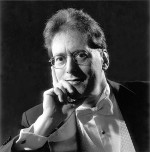Title
In the summer of 1966, Robert Levin, who has just become a visiting faculty member at Juilliard, was studying conducting with the legendary Hans Swarowsky, who abruptly said one day, “anyone who wants to play Mozart piano concertos properly has to improvise.” Levin said he was thunderstruck, and Swarowsky suggested he get a recording of a Mozart piano concerto he’d conducted with Friedrich Gulda. Levin did, and heard the pianist playing along with the orchestral tuttis—and making up the cadenzas. “I was astounded by the audacity and thought, ‘I want to learn how to do that,’” Levin told The Journal between Juilliard classes recently. Since it was the middle of the Vietnam War and he would have had to join the Army if he hadn’t gone back to Harvard to finish his bachelor’s degree, Levin resolved to teach himself to improvise Mozart. Thus began what would become an illustrious career of not only improvising cadenzas by Mozart (and Beethoven, Mendelssohn, Schubert, and even Liszt) but also teaching others how to do so—and why such a seemingly blasphemous activity is important.
Body
Nearly half a century later, Levin maintains an extremely active performing schedule while still doing research and conducting master classes. Having retired from teaching at Harvard, though he’s still a research professor there, he’s playing a more active role at Juilliard, where he’s given a number of master classes and lectures over the years. He’ll be coming here approximately eight times a year to give piano, fortepiano, and harpsichord lessons, and lead performance practice, piano improvisation, and chamber coaching seminars. “We’re thrilled to be able to benefit from his vast knowledge and expertise,” piano department chair and alum Yoheved Kaplinsky told The Journal. Robert Mealy, the director of Historical Performance, added that Levin is “one of the most inspiring figures I’ve worked with, both onstage and in the classroom.”
As a teenager, Levin studied piano with the legendary Nadia Boulanger in Paris. “What she did for those who had the stomach and ability to stay the course was to give her pupils a toolbox, and it was anything you were likely to need for the rest of your life as a musician, no what matter what kind—a conductor or a composer or a performer or a researcher,” he said. “So when I decided I need to learn how to improvise Mozart, I opened up that toolbox and realized I had what was needed because she had trained me in keyboard harmony, voice leading, and sensitivity to individual styles.”
The next discovery was that in order to improvise Mozart, he said he had to learn how to “compose Mozart” since “every note is a banana peel on which you can slip—if it doesn’t sound like Mozart everyone knows it, even if they’re a layperson.” Composing Mozart sounds like a tall order, but a chance opportunity to finish a fugue in Mozart’s Requiem—to great acclaim—let him do just that. He then discovered there were at least 140 unfinished Mozart pieces and soon had a cottage industry of commissions and a life’s work of improvising and teaching.
The thrill of having this level of knowledge of how a composer works is that “you’re the actor, the lighting designer, the costume designer, and the stage director,” Levin said. “You’re also the strategist, the chess player. You’re going to move the bishop halfway across the board—and then you realize that you can’t do that because he’ll be taken by the knight, so it’s better not to move the bishop there. And suddenly you realize Beethoven is doing something like that—or not doing something like that. And then a piece of music that seemed perfect and like an act of genius that’s inevitable and unalterable becomes incredibly volatile. And it’s like a murder mystery, where you think, ‘what would have happened if she had left the house three minutes later, and he would have reached her on the phone before she put the gun in her pocket?’ You want people to think about a Beethoven string quartet like that,” he added.
But how does all that translate to Juilliard students, few of whom, after all, are likely to be improvising onstage? “As a performer, instead of thinking, ‘I’ve mastered the Beethoven Violin Concerto and I’m going to be playing it for the next 50 years,’ you walk on stage, and everything is up for grabs,” Levin said. “I’m trying to teach people to cultivate the sense of risk in what they do” even though we live in an age where risk is discouraged—playing a wrong note in a competition could keep you from advancing to the next round. “It’s true that things that could get in the way of technical authority are dangerous,” he admitted. “But whether it’s Mission: Impossible III or a Hitchcock movie, the whole point is not the avoidance of risks but the thrill of danger. And if we want to save classical music for the next generation, it had better be dangerous, adventuresome, and unpredictable. There’s got to be something worth living for—and that’s not walking into a concert knowing that the person will not play a single false note or note out of tune.”
And that brings Levin back to the topic of teaching. “To educate people of the extraordinary artistic promise who inhabit Juilliard is an enormous responsibility, and a teacher who takes that mentoring seriously needs to look at these young artists and try to guide them through the process that will make them ever more clearly and unmistakably themselves,” he said. “We have to ensure that people who have a terrific flair are given the foundations that will power them for an entire lifetime.”





